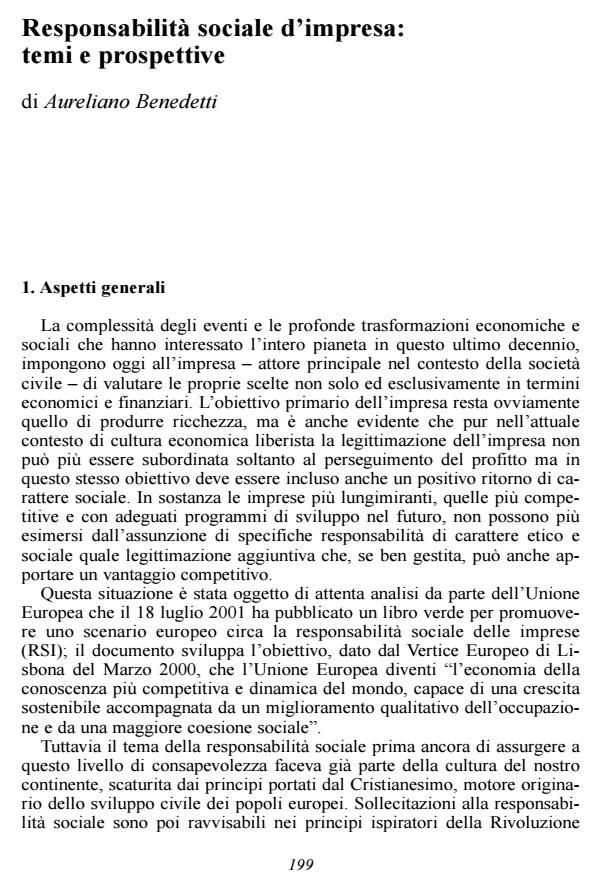Responsabilità sociale d'impresa: temi e prospettive
Journal title SOCIOLOGIA DEL LAVORO
Author/s Aureliano Benedetti
Publishing Year 2004 Issue 2004/96
Language Italian Pages 6 P. File size 15 KB
DOI
DOI is like a bar code for intellectual property: to have more infomation
click here
Below, you can see the article first page
If you want to buy this article in PDF format, you can do it, following the instructions to buy download credits

FrancoAngeli is member of Publishers International Linking Association, Inc (PILA), a not-for-profit association which run the CrossRef service enabling links to and from online scholarly content.
Social Corporate Responsibility: themes and prospects ABSTRACT: The deep-rooted and complex economic and social transformations that have characterized our planet in the last decade have forced companies, as the leading actors in civil society, to evaluate their choices beyond an exclusively economic and financial point of view. In the context of the global development of capitalism, where the sole arbiter of the situation is the market, there is at last a full realization of the necessity to draw business peoples’ attention to their social responsibilities, and above all to place companies in a new context of relations and values with respect to the area where they work. Naturally banks are not exempt from all this. As credit agencies they simply cannot function without taking into consideration the principles and values that are strictly linked to Social Corporate Responsibility. The savings banks sector has always, from the beginning, addressed the issue of social responsibility: by providing incentives to create saving as a presupposition for well-being. From there began the building of social values which reflect the historical role that savings banks have played in society and in local development. It’s clear that Social Corporate Responsibility must be at the basis of the economic behaviour of bank and companies, but it’s also essential not to force on businesses conditions which do not take into consideration the specific geographic and economic circumstances of the area where they work. There is a very strong element of subjectiveness in the definition of socially responsibile behaviour. At this point it must also be emphasized that small and medium-sized companies cannot be excluded from all this because they represent the keystone of our country’s economy. The aim must be for the involvement of a diversity of people who work in the area in question: a culture of social corporate responsibility cannot exist without the widespread involvement of the business community. A final consideration: we currently live in a climate of fast economic development, ever-increasing interdependence among companies and a culture that tends to ascribe responsibility to the law, or at least to collective organizations. All of this leaves individual responsibility too much to one side. On this note it is important not to forget that the categorical imperatives and the abstract definitions of ethical values must bow down before the individual’s sense of moral and civil responsibility, because at the end of the day it is still the individual, protagonist of history, who chooses his or her future and in this way conditions the world.
Aureliano Benedetti, Responsabilità sociale d'impresa: temi e prospettive in "SOCIOLOGIA DEL LAVORO " 96/2004, pp , DOI: